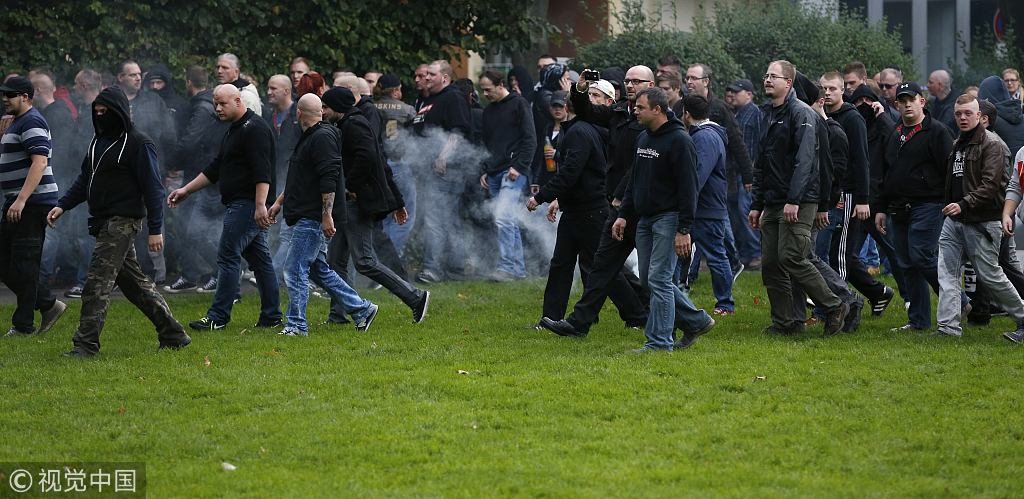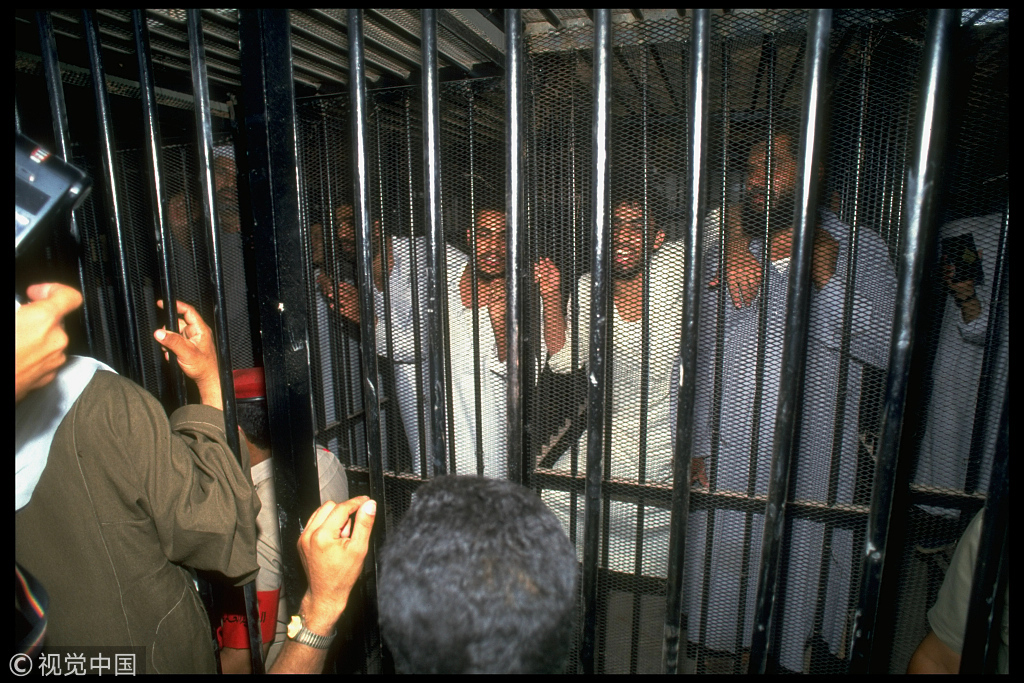
Opinion
18:00, 23-Mar-2019
The policies of the U.S. and its allies planted the seeds of extremism
Ken Moak

Editor's note: Ken Moak taught economic theory, public policy and globalization at the university level for 33 years and co-authored a book titled "China's Economic Rise and Its Global Impact" in 2015. The article reflects the author's opinion, and not necessarily the views of CGTN.
Extremism, either in the form of “white supremacy” or “Muslim terrorism”, is on the rise across the globe, particularly in the West. The latest includes a “white supremacist” killing 50 people in two mosques in Christchurch, New Zealand, a Turkish national murdering three people in Utrecht, the Netherlands, and a group of whites shooting four Africans in Italy. These violent acts did not just “came out of the blue”, but are the consequences of failed, or a lack of, policies on globalization and regime change.
Not addressing the adverse effects of globalization and carrying out regime changes on countries or leaders refusing to toe the U.S. line has culminated in persistent slow economic growth and racial tensions, both of which led to populism and conflicts.
Insufficient remedial programs on globalization
The West is right in promoting globalization because it has brought benefits to the world. Relocating manufacturing to countries in which they have a comparative cost advantage brought economies of scale, improved competitiveness, raised profits, stabilized inflation and improved standard of living. For example, low-priced imports from China and other developing nations saved the average American family nearly 900 U.S. dollars a year. And because of globalization, hundreds of millions of people were lifted out of poverty in China and other developing countries.
Costs of globalization included the loss of “high paying” manufacturing jobs, therein lies the problem: Neither businesses nor governments implemented job retraining programs for the workers who were displaced by the closing of factories and automation. Those who were adversely affected by the structural change blamed the political and business elites for “selling” them out.
As that were not bad enough, haphazard U.S. financial reform policies led to the 2008 financial crisis, resulting in the worst economic problem not seen since the 1930-era Great Depression. The creation of risky financial derivatives – collateral debt obligations and credit default swaps – and subprime mortgages culminated in financial and housing bubbles, leaving a trail of debts and bankrupting many banks, businesses and consumers.
Because governments and businesses were unable or unwilling to institute pro-active policies, the Western economies must endure prolonged periods of slow economic growth, giving rise to populism and protectionism or a replay of the pre-Great Depression era movie in which the populist Adolf Hitler and his Nazi gained control of Germany's political agenda.

Protestors walk through a park during a demonstration by German far-right groups in Cologne October 26, 2014. /VCG Photo
Protestors walk through a park during a demonstration by German far-right groups in Cologne October 26, 2014. /VCG Photo
In Europe, far-right political parties such as Germany's AfD blamed globalization and non-white immigration instead of insufficient remedial policies. In Europe, non-white immigrants were blamed for everything under the sun. Brexit, the UK leaving the EU, was believed by some as an anti-white (and Eastern European) immigration stance. Like their European counterparts, the British who supported Brexit blamed immigrants for rising crime rates and taxing the social programs.
On the other hand, the immigrants were marginalized in the job market and society. To vent their frustration, young Muslims resorted to violent protests as seen across Europe and joined ISIL and other “terrorist” groups. But committing violence hardened the host country's position against them, creating a vicious circle of increasing conflicts between the host country population and newly arrived immigrants.
In the U.S., Donald Trump gained popularity by bashing the political and business elites, Mexican immigrants, and the world particularly China for America's economic plights. The “disenfranchised” believed him because of Mexican gangs and Chinese imports were seen as China hallowing factories and stealing jobs because Americans used to make the products. But unlike his predecessors (who also played the China card for political gains), Trump has made it his mission to bash China, accusing the country of “eating America's lunch”. He also labels Mexicans as “rapists or drug dealers” and Muslims as “terrorists”.
It is therefore no surprise that racial and religious “hate crimes” increased by 17 percent in 2017 year-on-year, according to the Federal Bureau of Investigations (FBI). African, Arabs and Jewish Americans were the main targets.
He cited China's “unfair practices” as the reason for mounting the trade war on China, imposing tariffs on over 250 billion U.S. dollars of Chinese “imports”. Although Trump also imposed tariffs on imports on Canad, Mexico, Europe and other allies, the amount of goods affected were far less than those of China's.
U.S.-led regime change

Caged defendants, Islamic fundamentalist extremists on trial for attacking Christians, shooting police & bombing tour buses, in court. /VCG Photo
Caged defendants, Islamic fundamentalist extremists on trial for attacking Christians, shooting police & bombing tour buses, in court. /VCG Photo
Islamic “terrorism” was rare or non-existent until the U.S. and its allies started to bomb Arab countries. Though speculations abound, it is still a mystery why Bill Clinton decided to bomb Afghanistan in the midst of his impeachment by the Congress. George W. Bush coerced allies in invading Iraq, falsely accusing Hussein Saddam of possessing weapons of mass destruction.
The bombing, destruction and killing in the Arab world did not end with Bush, even if Barack Obama called the Iraq War a “stupid war”. Obama along with his state secretary Hillary Clinton bombed Libya and later Syria. Current President Donald Trump continued with the regime change policy, bombing Syria and other countries. The result was a massive refugee problem, causing millions of Muslim migrants breaking down Europe's doors.
However, instead of accepting responsibility for fermenting white nationalism and Muslin “terrorism”, the U.S. (and its allies) not only continue to but, in fact, escalate regime change policies. The latest is encouraging Venezuelan dissidents and people to overthrow the democratically-elected president Maduro, expanding “terrorist-related” violence from the Middle East to South America.
Though both China and the U.S. have spoken of “great progress” in talks on negotiating a deal to end the trade war, the reality might not be so optimistic. This is because the U.S. seems to be “moving the goalposts” when China made concessions. It is not enough to buy more U.S. goods or ban “forced technology transfers”, the U.S. wants “enforceable” and “verifiable” mechanisms (whatever they are or mean). Indeed, the only deal that might be acceptable to the U.S. is China surrenders its sovereignty. That would not happen, resulting in the continuation if not escalating the U.S.-China trade war and by extension, worsening the global economy.
Unless the U.S. and its allies' policies on globalization and terrorism are reversed, extremism or terrorism would likely rise and become more deadly. Its time for America to respect other nations' interests and sovereignty.
(If you want to contribute and have specific expertise, please contact us at opinions@cgtn.com)

SITEMAP
Copyright © 2018 CGTN. Beijing ICP prepared NO.16065310-3
Copyright © 2018 CGTN. Beijing ICP prepared NO.16065310-3